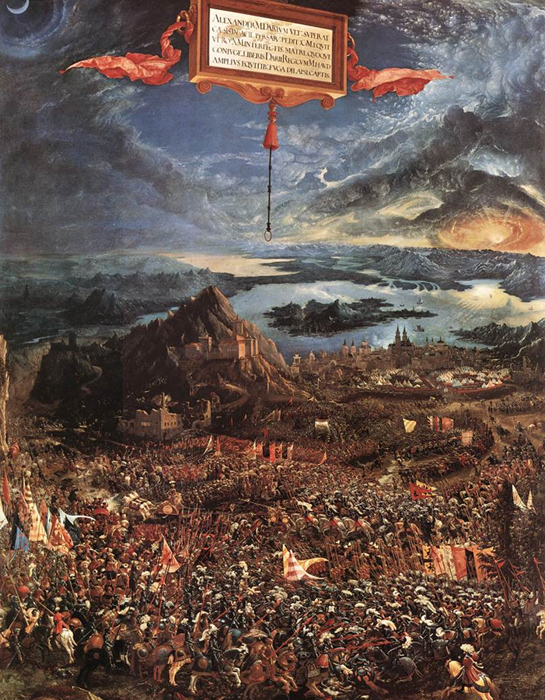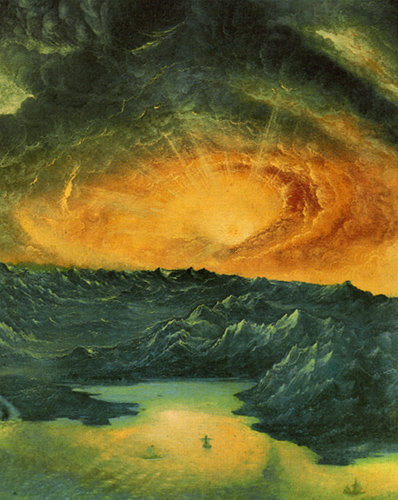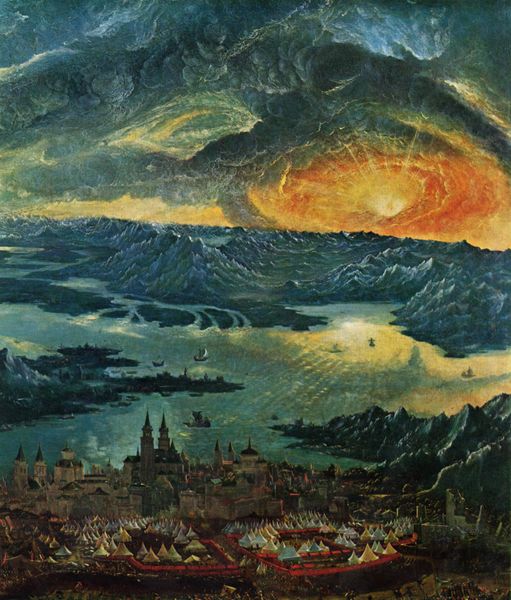|
From an Art History Site called All-Art.org:
Alexander, whom posterity styles "the Great", was twenty-three years old when he and his Greek troops encountered an adversary old enough to be his father, King Darius III of Persia. Battle was joined on the plain of Issus, an old Mediterranean port near what is now the Turkish-Syrian border, in 333 BC. The brilliant Alexander, a pupil of the philosopher Aristotle, managed to break into the Persian left flank. He is said to have looked so piercingly into Darius's eyes that the Persian king fled. His troops panicked and the massacre that ensued lasted until late that night.
During the battle Darius's mother, wife and children were captured. Alexander treated them honourably, which earned him the respect of the Persians. As hostages, however, they did influence Darius's behaviour. Yet, when Darius showed readiness to compromise, Alexander refused his offer. His decision made world history. He wanted to conquer Persia, but much more he wanted to rule the world: "Should you desire to know what my aim is, you should know that the bounds of my new Empire will be those that God has set the earth." After defeating Darius a second time, he conquered Egypt, the kingdom of Babylon and eastern Persia, calling himself the "King of all Asia." He drove the borders of his vast empire far beyond what is now Pakistan, all the way east to India and the banks of the River Bias. His victories were not merely political. More importantly, he carried Hellenic culture with him everywhere he went. He also promoted religious tolerance, including of Judaism. Napoleon thought highly of him, admiring in particular Alexander's ability to win the hearts of the peoples he conquered.
Albrecht Altdorfer was the first great painter to take landscape as his exclusive subject matter. He represented the historic Battle of Issus as one of his contemporaries, the German physician and scholar Paracelsus, might have viewed it: an epic struggle of life and death fought out on a cosmic scale, whose drama is reflected in the swirling clouds above and the endless vista bevond.
Many of Schedel's and Altdorfer's contemporaries were tormented by the fear that the world was coming to an end. Even Luther believed it. One of Luther's commensals reported: "the following day he again spoke much of the Day of Judgement and of the end of the world, for he has been troubled by many terrible dreams of the Last Judgement this half year past ..." On another occasion Luther complained: "Dear Lord, how this world is reduced ... It is drawing to a close." Or: "When I slept this afternoon I dreamt the Day of Judgement came on the day of Paul's conversion."
Dreams, premonitions and prophecies of the end of the world were fed not only by calculations based on the "seven days" premise, as in Schedel's work. Calculations of an entirely different order, those of the prophet Daniel, seemed to point in the same direction. He had predicted that four kingdoms would come and go, before the com-ing of the kingdom of the Lord. The four kingdoms were thought to be Babylon, Persia, Greece and Rome. This was problematic, however, for the Roman Empire had long since passed away. A route out of the quandary -was found by propounding that Rome still existed - in the form of the papacy. By Luther's time, however, the papacy was so much gone to seed that it really did seem on its last legs. Luther: "Daniel saw the world as a series of kingdoms, those of the Babylonians, Persians, Greeks and Romans. These have passed away. The papacy may have preserved the Roman Empire, but that was its parting cup; now that, too, is gone into decline."
This comment, along with other examples of Luther's "table-talk", was recorded in 1532, four years after Altdorfer began work on his painting. Altdorfer was undoubtedly aware of the eschatalogical preoccupations of his contemporaries. As a member of the leading body of the town in which he lived, he was forced constantly to deal with questions relating to the church.
If we take for granted that Altdorfer knew of these things, and that he, too, sensed what it was to live at the end of Time, then the sky over the Battle of Issus assumes a new meaning. In the original work, the sky was bigger; the painting was reduced in size at a later date when strips were cut from all four sides, with the largest section removed from the top. The moon, too, originally stood further from the corner of the painting. Even in its present size, however, the sky covers more than a third of the painting's surface. With its sharply contrasting lights and darks, dynamic congregation of clouds and sun reflected in the sea, it suggests the occurence of an extraordinary event.
|





